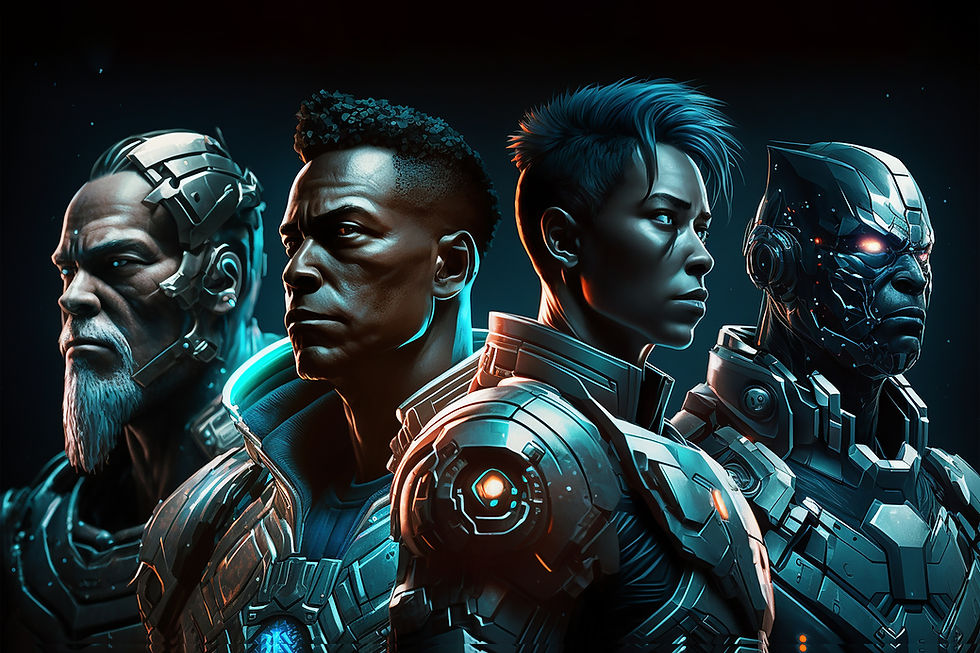Why AI Will Never Fully Replace Human Creativity And Emotion
- Raghavendra Prasad
- Jul 23, 2023
- 4 min read
Updated: Aug 3, 2023
Artificial Intelligence (AI) has been making waves in many industries, from healthcare to manufacturing, and everything in between. However, there is a growing concern that AI may one day replace human creativity and emotion. The fear is that AI will take over jobs that require a human touch, such as writing, music, and art. But is this really possible? Can AI truly replicate the complexity of human thought, emotion, and creativity? Let’s explore why AI will never fully replace human creativity and emotion, and how the two can work together to achieve even greater things.
In recent years, AI has made significant strides in its development. AI is essentially a machine or a software program that can perform tasks that usually require human intelligence. AI has become an integral part of a wide range of industries where it is used to improve efficiency, accuracy, and decision-making. AI-generated music and art have been gaining popularity, and some companies are using AI to help with content creation and marketing strategies.
Creativity is the ability to generate new ideas, concepts, and solutions. It is the ability to think outside of the box and explore new possibilities. Emotions inspire and drive creativity making it resonate with audiences without them the creative work would lack depth, meaning, and originality. Each person has their own perspective, experiences, and personality, which they bring to their creative work which makes it so special and memorable.
For example, the emotional impact of music is what makes it resonate with people and stand the test of time. Writers infuse their work with emotion, imagination, and style, making their creations stand out and resonate with readers.
One of the limitations of AI is that it lacks the ability to experience human emotion. While AI can process and analyse emotions, it cannot understand them in the same way that humans can. This is a crucial aspect of creativity because emotions play a significant role in the creative process. Additionally, AI lacks intuition, which is an essential component of creativity. Intuition is the ability to understand something instinctively, without the need for conscious reasoning. This ability is difficult to replicate in an AI system, making it challenging for AI to create something truly original and groundbreaking.
The two very important aspects that human beings are gifted with which AI lacks is imagination and empathy. Imagination allows humans to think beyond what is currently known and explore new ideas and perspectives. Empathy enables humans to understand and connect with others on an emotional level, which is an integral part of creative expression. These unique qualities are what make human creativity and emotion so valuable in the creative process.
Another limitation of AI in creativity is that it cannot replicate the human touch. Art, music, and writing are all forms of creative expression that require a human touch to truly come alive.
“AI is not intelligent, it is just an advanced, automated, completely charged internet that gives the illusion of intelligence. AI may also potentially contribute to false propaganda, for example, if the economy is not doing good, it can actually tell the opposite. He questioned, can AI determine if you are cancerous or not, can it help determine how some people murder someone? AI may not be able to synthesise human reactions and emotions while it can certainly help us be more efficient, but definitely can’t replace that human touch.” said Dr. S.S. Iyengar, Ryder Professor and Director, Florida International University, Florida, USA.
AI can play a significant role in enhancing human creativity and emotion. For example, AI can be used to analyse data and identify patterns, which can then be used to inspire human creativity. It can also be used to generate ideas and even complete certain tasks, freeing up human creativity to focus on more complex and emotionally resonant work.
Furthermore, AI has the potential to democratise creativity by providing opportunities for people who may not have had access to traditional creative outlets. For example, AI-generated music and art can provide a starting point for aspiring musicians and artists, who can add their personal touch and emotion to work, which can lead to a more diverse and inclusive creative landscape, where everyone has the opportunity to express themselves creatively. As we know, communication is key in any relationship, and it’s not always easy, but it’s the only way to build trust, loyalty and create long-lasting partnerships. Plus, it gives a sense of highness every single time to be real and authentic.
In conclusion, the future of AI and human creativity is one of collaboration and balance. The relationship between AI and human creativity is symbiotic. AI can perform certain tasks with impressive efficiency, but it lacks the unique qualities that humans possess. The best way forward is to find a balance between the two, where AI can be used to inspire and assist human creativity, while human creativity infuses AI-generated content with emotion, personality, and style, and they are what make creative work memorable, impactful, and emotionally resonant. Together, AI and human creativity can co-exist and thrive in the digital age, creating a more diverse, inclusive, and impactful creative landscape.

Comments